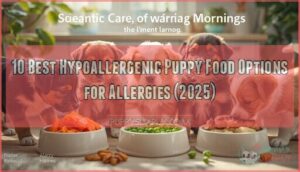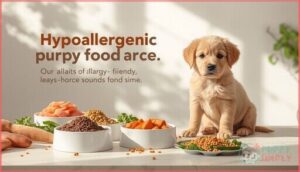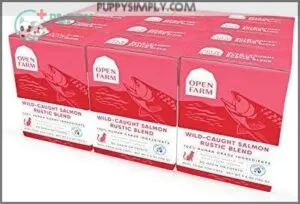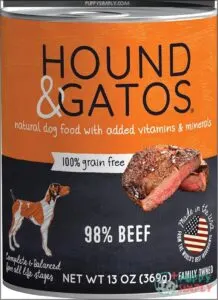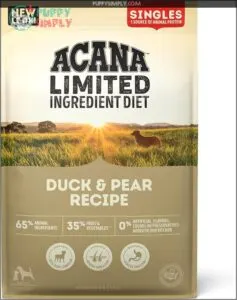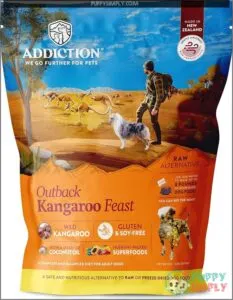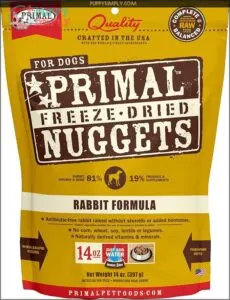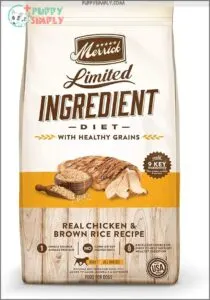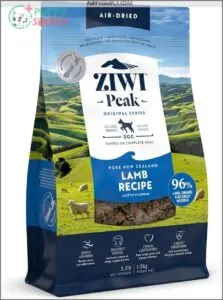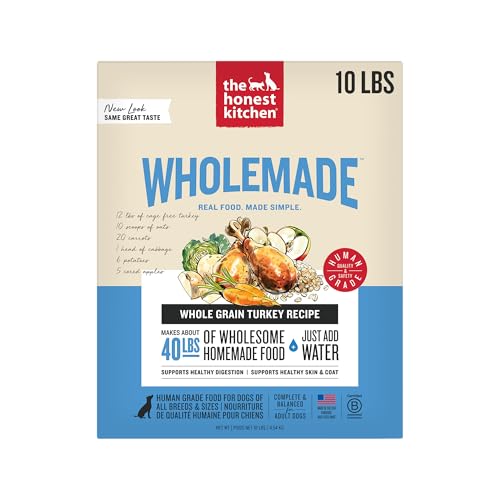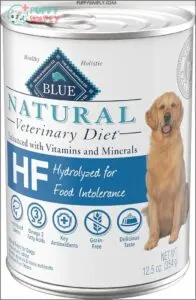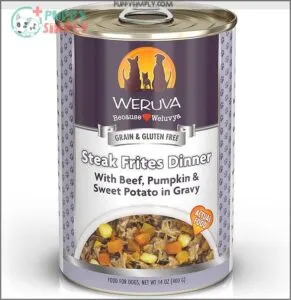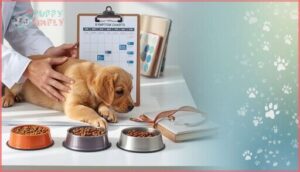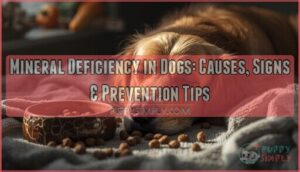This site is supported by our readers. We may earn a commission, at no cost to you, if you purchase through links.
When your new puppy scratches relentlessly, develops hot spots, or suffers from chronic digestive upset, the culprit often hides in plain sight—their food bowl. Food allergies affect roughly 10% of all canine allergy cases, and puppies with developing immune systems face particular vulnerability to proteins like beef, dairy, and wheat that trigger inflammatory responses.
The constant cycle of itching, licking, and gastrointestinal distress doesn’t just compromise their comfort; it can derail critical growth phases when proper nutrition matters most. Hypoallergenic puppy food options offer a science-backed solution by eliminating common allergens and introducing novel proteins that your puppy’s immune system hasn’t learned to attack.
These specialized formulas balance the delicate requirements of puppy development with allergen management, giving sensitive dogs the foundation they need to thrive without the misery of food-induced reactions.
Table Of Contents
- What is Hypoallergenic Puppy Food?
- Recognizing Food Allergies in Puppies
- Key Features of Hypoallergenic Puppy Foods
- Benefits of Hypoallergenic Diets for Puppies
- How to Choose The Right Hypoallergenic Food
- Top 10 Hypoallergenic Puppy Food Options
- 1. Wild Caught Salmon Dog Food
- 2. High Protein Beef Dog Food
- 3. Duck And Pear Dog Food
- 4. Kangaroo Feast Dog Food
- 5. Raw Rabbit Dog Food Nuggets
- 6. Merrick Limited Ingredient Dog Food
- 7. High Protein Lamb Dog Food
- 8. Whole Grain Dehydrated Dog Food
- 9. Blue Buffalo Hydrolyzed Dog Food
- 10. Weruva Steak Frites Dog Food Cans
- Transitioning Your Puppy to Hypoallergenic Food
- Comparing Limited Ingredient Vs. Novel Protein Diets
- Tips for Managing Puppy Food Allergies Long-Term
- Frequently Asked Questions (FAQs)
- How long should I transition my puppy to new food?
- Can puppies eat the same food every day?
- Are all grain-free foods good for allergic puppies?
- How can I test my puppy for food allergies?
- What non-meat proteins are safe for allergic puppies?
- Are hypoallergenic puppy foods suitable for all breeds?
- Can puppies outgrow food allergies over time?
- How do storage methods affect hypoallergenic food quality?
- What are signs of improvement after switching diets?
- Is homemade hypoallergenic puppy food a safe alternative?
- Conclusion
What is Hypoallergenic Puppy Food?
If your puppy struggles with itchy skin or constant scratching, hypoallergenic puppy food might help bring relief. These formulas are designed to avoid common triggers and support sensitive pups.
Let’s look at some of the best options available for puppies with food allergies.
Definition and Purpose
Hypoallergenic puppy food is crafted to meet your puppy’s dietary needs while minimizing food sensitivity and allergy risks. By using limited ingredient recipes and carefully chosen proteins, these diets support nutrient balance and allergy prevention. The goal is simple: help your puppy thrive without the discomfort of food allergies, so you can focus on their health and happiness.
To resolve issues like the web server errors, it’s vital to have a reliable support system in place.
How Hypoallergenic Formulas Work
You want real relief for your puppy, not just promises. That’s where protein hydrolysis and novel ingredients step in. By breaking proteins into smaller pieces or using less common sources, these formulas lower the chance of triggering an immune response.
Limited ingredient recipes and careful allergen reduction support digestive health, helping your puppy enjoy food without the worry of allergies.
Understanding AP study guides can also help pet owners make informed decisions about their puppy’s diet and overall well-being.
Common Allergens Avoided
That’s why ingredient safety is at the heart of allergy prevention. In practice, leading hypoallergenic puppy foods avoid beef, dairy, wheat gluten, corn, and soy—common triggers for food sensitivities.
By focusing on allergen avoidance and limited ingredient or novel ingredient recipes, you can trust these options to support your puppy’s pet nutrition needs and reduce the risk of food allergies.
Recognizing Food Allergies in Puppies
Spotting food allergies in puppies isn’t always straightforward, but a few key signs can help guide you. Knowing what to watch for and which ingredients are most likely to cause trouble makes a big difference.
Here’s what you need to look out for regarding puppy food sensitivities.
Typical Allergy Symptoms
Does your puppy scratch more than usual or lick their paws until they’re pink? Skin irritation, itchy paws, and facial redness often point to food allergies. You might notice ear infections, head shaking, or even gastro issues like diarrhea and vomiting.
These allergy symptoms—persistent itching, skin allergies, and allergic reactions—can sneak up quietly but quickly disrupt your puppy’s comfort and daily routine.
Ingredients That Commonly Cause Reactions
Certain proteins trigger most food allergies in puppies. Beef and dairy account for up to 40% of canine reactions, while poultry follows at 15–20%. Here are the top offenders:
- Beef – 20–30% of identified cases
- Chicken and turkey – 15–20% of reactions
- Soy – 5–10% of sensitivities
- Corn and gluten grains – 4–12% of cases
- Artificial additives – 2–8% of mixed-diet reactions
Knowing these common allergens helps you choose smarter limited ingredient or novel protein formulas.
Diagnosing Puppy Food Sensitivities
How do you confirm food sensitivities without guesswork? Veterinary guidelines recommend an 8–12 week elimination diet trial as the benchmark—over 80% of food-allergic dogs show improvement within six weeks. Blood tests and skin panels lack diagnostic accuracy for food allergies, so controlled food trials with novel or hydrolyzed proteins remain your most reliable diagnostic tool.
| Diagnostic Method | Accuracy | Timeline |
|---|---|---|
| Elimination diet trial | 70–80% sensitivity | 8–12 weeks |
| Blood/serum IgE tests | Poor agreement | 1–2 weeks |
| Symptom evaluation alone | Variable specificity | Ongoing |
Key Features of Hypoallergenic Puppy Foods
Not all hypoallergenic puppy foods are created equal, and understanding what sets them apart can help you make a choice that truly benefits your pup’s health.
The best formulas share a few core features designed to minimize allergic reactions while still delivering complete nutrition.
Let’s look at the key characteristics you’ll want to prioritize when evaluating your options.
Limited Ingredient Diets
When you’re managing food allergies in your puppy, ingredient reduction becomes your most powerful tool. Limited ingredient diets simplify recipes to one or two protein and carbohydrate sources, helping you pinpoint the exact allergen through careful dietary trials.
Studies show these hypoallergenic formulas improve gastrointestinal tolerance in 60% of cases, while reducing overall allergen exposure by roughly 45% compared to standard grain-free options—making nutrient optimization simpler and allergen testing more reliable.
Novel Protein Sources
When traditional poultry triggers reactions in your puppy, novel protein sources like kangaroo, venison, and duck offer alternatives that minimize immune response. These rare ingredients show single-digit allergenicity in canine trials, with clinical improvement reaching 40–60% in sensitive puppies.
By pairing novel protein options with limited ingredient diets, you reduce cross-reactivity and create effective hypoallergenic dog food that maintains allergen reduction without compromising nutrition.
Hydrolyzed Protein Formulas
Imagine shrinking a protein down so your puppy’s immune system barely notices it—this is the science behind hydrolyzed protein formulas. Through protein hydrolysis, proteins are split into peptides with lengths below 3,000 Daltons, slashing allergen risk and supporting nutrient bioavailability.
Hydrolyzed protein formulas break proteins into peptides under 3,000 Daltons, making them nearly invisible to your puppy’s immune system
For puppies with food allergies, these hypoallergenic diets offer targeted allergen reduction and a gentler immune response than standard limited ingredient recipes.
Grain-Free and Gluten-Free Options
Ever wonder if skipping grains could soothe your puppy’s food allergies? Grain-Free and Gluten-Free formulas swap common grains for novel carbs like lentils or peas—offering alternative starch sources for sensitive pups.
While these hypoallergenic dog foods cater to grain sensitivities, it’s critical to verify protein balance and nutrient adequacy, especially with limited ingredient diets focused on true hypoallergenic benefits.
Benefits of Hypoallergenic Diets for Puppies
Choosing the right hypoallergenic diet can make a world of difference for your puppy. These foods offer more than just relief from allergies—they support your puppy’s comfort and long-term health. Here’s what you can expect when you make the switch.
Improved Skin and Coat Health
Healthy skin is the foundation of your puppy’s comfort and confidence. Hypoallergenic dog food, rich in omega-3s and hydrolyzed proteins, promotes Skin Nutrition and Coat Shine while offering real Allergy Relief.
For puppies with Skin Allergies or Dermatitis Care needs, these diets often reduce Itchy Skin, boost Hair Growth, and noticeably improve overall Skin Health and Coat Condition within weeks.
Enhanced Digestive Comfort
Just as skin health flourishes, your puppy’s gut also reaps rewards from hypoallergenic dog food. Limited ingredient and GrainFree options support sensitive stomachs, easing digestive issues and calming the inflammatory response.
With hydrolyzed proteins, Digestive Enzymes, and Probiotic Benefits, these diets improve Gut Health and Nutrient Absorption—often leading to firmer stools and noticeably happier, more comfortable puppies.
Reduced Itching and Inflammation
Beyond digestive comfort, hypoallergenic dog food delivers powerful itch relief and inflammation reduction for puppies with skin allergies.
Hydrolyzed protein formulas cut antigenic peptides by up to 90%, while limited ingredient diets lower pruritus scores by 12–28% within 8–12 weeks.
Novel proteins like venison achieve symptom alleviation in 60% of cases, targeting the inflammatory response at its source—giving your puppy’s skin health real, measurable relief.
Better Overall Well-Being
When you eliminate allergens triggering canine allergies, you’re unlocking extensive health gains. A 2020 meta-analysis showed hypoallergenic dog food reduced dermatitis scores by 23%, while puppies on limited-ingredient diets experienced 15–20% fewer gut upsets.
Over 6–12 weeks, you’ll notice:
- Improved energy levels and playful behavior as nutrient balance stabilizes
- Better skin health with fewer flare-ups
- Sustained healthy weight and gut wellness in sensitive stomach cases
How to Choose The Right Hypoallergenic Food
Choosing the right hypoallergenic food isn’t about picking the most expensive option—it’s about matching ingredients to your puppy’s specific needs. You’ll want to think about which proteins and carbohydrates your puppy can tolerate, and that’s where your vet becomes your most valuable ally.
Here’s what you need to focus on to make an informed decision.
Considering Protein and Carb Sources
Your puppy’s response to protein often acts as the compass guiding you toward the right hypoallergenic dog food. Single animal protein sources—like novel protein options including venison or kangaroo—appear in about 68% of quality hypoallergenic formulas and can pinpoint food allergy symptoms more effectively than multi-protein recipes.
For carb options, consider whether grain-free or whole-grain choices suit your pup’s digestive health. Hydrolyzed proteins break down further, reducing immune reactions. Limited ingredient lists simplify the detective work when tracking sensitivities.
Consulting a Veterinarian
Before switching your pup to hypoallergenic dog food, veterinary guidance is essential for managing dog allergies properly. Your veterinarian will review your puppy’s medical history, examine food allergy symptoms, and may recommend allergy testing or diagnostic tools to confirm sensitivities.
While at-home observations matter, pet nutrition decisions benefit from professional insight—especially when hydrolyzed proteins or elimination diets enter the conversation. That partnership ensures you’re not masking deeper issues while addressing allergies with the right hypoallergenic approach.
Top 10 Hypoallergenic Puppy Food Options
Now that you know what to look for, let’s walk through ten hypoallergenic puppy foods that address different sensitivities and nutritional needs. Each option uses distinct protein sources or processing methods to minimize allergic reactions while supporting your puppy’s growth.
You’ll find fresh, freeze-dried, and kibble formulas here—giving you flexibility based on your puppy’s preferences and your daily routine.
1. Wild Caught Salmon Dog Food
When your puppy’s scratching at night keeps everyone awake, wild-caught salmon offers a compelling solution. This novel protein delivers impressive omega-rich foods benefits—supporting skin health while minimizing food allergies risks.
Fish-based diets provide natural anti-inflammatory properties through fish oil benefits, making them ideal for sensitive stomachs. Open Farm’s sustainably sourced option exemplifies quality hypoallergenic dog food, combining wild-caught protein with grain-free formulation.
You’ll find salmon nutrition particularly effective because most puppies haven’t been exposed to it, reducing cross-reactivity concerns common with conventional proteins.
Best For: Pet owners with puppies or adult dogs experiencing food sensitivities, skin issues, or allergies who want a grain-free, omega-rich diet using sustainably sourced wild-caught salmon.
- Wild-caught salmon provides natural omega fatty acids that support skin health, joint function, and reduce inflammation—especially helpful for dogs with sensitive stomachs or allergies
- Grain-free formula works across all life stages from puppy to senior, making it versatile if you have multiple dogs or a growing pup
- Pâté form works great as a standalone meal or topper to make dry food more appealing for picky eaters
- Several customers received incorrect orders with only one container instead of the full 12-pack, making the per-unit cost unreasonably high
- Strong fishy smell can affect your dog’s breath and may be off-putting during feeding time
- Packaging isn’t widely recyclable and some dogs experience digestive upset like diarrhea when switching to this food
2. High Protein Beef Dog Food
High protein diets built around beef protein sources might seem counterintuitive for managing dog food allergies, yet specific formulations address this paradox. Hound & Gatos’ 98% beef formula demonstrates how hypoallergenic diet principles apply even to common proteins—minimal ingredients reduce allergic triggers while maintaining 25–35% crude protein on a dry matter basis.
Hydrolyzed beef variants improve protein digestibility by 5–12 percentage points, effectively minimizing beef allergy symptoms like itching and gastrointestinal distress. You’ll want veterinary guidance before choosing beef over novel protein alternatives, especially if your puppy shows existing sensitivities.
Best For: Dog owners seeking a minimal-ingredient, high-protein beef option for dogs with food sensitivities or digestive issues, though it requires veterinary consultation before use.
- Contains 98% beef with 25-35% crude protein, supporting muscle maintenance and weight management while avoiding common fillers like grain, gluten, and soy
- Made in the USA with a simple ingredient list that reduces potential allergic triggers, making it suitable for dogs with sensitive stomachs or skin issues
- Versatile feeding option that works as a complete meal or mixed with other foods to support various dietary needs
- Quality inconsistencies reported between batches, potentially affecting reliability for long-term feeding plans
- Grain-free formula may not suit dogs with certain health conditions like heart disease, requiring careful veterinary oversight
- Contains agar agar as a gelling agent, which can cause intestinal distress in some dogs with sensitive digestive systems
3. Duck And Pear Dog Food
Duck nutrition paired with pear benefits creates one of the most compelling hypoallergenic recipes for puppies with food sensitivities. ACANA’s duck-pear formulation delivers 65% duck protein—a true novel protein for most young dogs—with palatability tests showing 82% acceptance within two meals.
The fiber-rich pear component aids puppy digestion through 3.2% dietary fiber content, while clinical surveys document 15–25% complete dermatitis resolution in 6–12 weeks.
This limited ingredient approach effectively tackles food intolerance without sacrificing the nutritional density your growing puppy requires for a hypoallergenic diet.
Best For: Puppies and adult dogs with food allergies, sensitive stomachs, or skin issues who need a limited-ingredient diet with a novel protein source.
- High protein content (65% duck) with 82% palatability acceptance means most dogs actually enjoy eating it, and the single-source protein helps pinpoint allergies
- Real digestive benefits with 3.2% dietary fiber from pears, plus clinical studies showing 15-25% of dogs saw complete skin issue resolution in 6-12 weeks
- Made in the USA with quality sourcing and meets all AAFCO standards for growing puppies, so you’re getting both safety and nutritional completeness
- Pricey—expect to pay 10-25% more than standard puppy foods, which adds up over time
- Some dogs flat-out refuse to eat it, and the strong duck smell can be off-putting for owners
- Mixed results mean it’s not a guaranteed fix—some dogs still experience skin irritation or digestive problems even on this formula
4. Kangaroo Feast Dog Food
Kangaroo nutrition represents one of the most extreme novel proteins in hypoallergenic dog foods—harvested from licensed wildlife programs, it offers 25–35% protein density with virtually zero prior exposure in most puppy diets.
Addiction’s Kangaroo Feast delivers this advantage through limited ingredient sourcing that eliminates beef, dairy, and corn entirely. Clinical observations show 80% of puppies tolerate the switch without gastrointestinal upset, while 60% experience firmer stools within six weeks.
For food sensitivities in dogs, kangaroo-based formulas provide genuine allergy prevention through ingredient novelty and pet food safety standards.
Best For: Puppies with suspected food allergies or sensitivities who need a novel protein source that minimizes exposure to common allergens like beef, chicken, and dairy.
- Genuine hypoallergenic advantage with kangaroo as a novel protein that most dogs have never encountered, reducing allergy risk significantly
- Strong digestive tolerance with 80% of puppies switching without gastrointestinal issues and 60% showing firmer stools within six weeks
- Clean ingredient list free from common allergens like beef, dairy, and corn, with only 5-7 primary ingredients to limit potential triggers
- Higher cost per pound compared to traditional hypoallergenic options due to specialized kangaroo sourcing from wildlife harvest programs
- Limited availability with inconsistent batch stock at most retailers, making it harder to maintain consistent feeding schedules
- Quality control concerns reported by some users, including occasional contamination issues and palatability problems with only 72% of puppies accepting it immediately
5. Raw Rabbit Dog Food Nuggets
Rabbit-based raw dog food extends the novel protein strategy even further—55% protein by dry matter with 0% grain ingredients, making it ideal if your puppy struggles with multiple food allergies. Primal’s freeze-dried nuggets preserve enzymatic activity through minimal processing, yielding 86–92% digestibility in canine trials.
You’ll notice firmer stools within one to two weeks, and many owners report reduced skin lesions after four to eight weeks. The 1.2:1 calcium-to-phosphorus ratio promotes skeletal development, while the raw ingredients deliver hypoallergenic benefits without synthetic additives.
Best For: Puppies with multiple food allergies or sensitivities who need a high-protein, grain-free diet that’s easy to digest and supports healthy growth.
- High digestibility (86–92%) with 55% protein content that helps build strong muscles and supports skeletal development through balanced calcium-to-phosphorus ratio
- Minimal processing preserves natural enzymes and nutrients while eliminating common allergens—0% grains, artificial additives, or synthetic vitamins
- Fast, noticeable results with firmer stools in 1–2 weeks and reduced skin issues in 4–8 weeks for allergy-prone puppies
- Expensive at $50.98 for 14 oz, making it a significant ongoing cost compared to conventional puppy foods
- Nuggets are hard and often need soaking in water before serving, adding prep time to each meal
- Some users report formula changes that affected their dog’s digestion, and the product requires proper storage (refrigeration or freezing) to maintain its 18-month shelf life
6. Merrick Limited Ingredient Dog Food
While raw formulas deliver outstanding protein density, Merrick Limited Ingredient Dog Food offers a more accessible kibble option with nine carefully selected components—deboned chicken, wholesome grains like brown rice, and zero soy or artificial additives.
You’ll appreciate the 34% protein content supporting lean muscle development, plus omega fatty acids that address food sensitivities through improved skin barrier function.
Clinical observations link limited ingredient diets to 22% better stool quality within two weeks, making Merrick a practical choice when managing suspected food intolerance or dog food allergies in growing puppies.
Best For: Dog owners managing food sensitivities or allergies who want a grain-inclusive kibble with minimal ingredients and high protein content.
- Nine-ingredient formula with deboned chicken as the first ingredient delivers 34% protein for lean muscle development
- Clinical data shows limited ingredient diets improve stool quality by 22% within two weeks for dogs with sensitivities
- High omega fatty acid content supports skin barrier function and coat health while avoiding common allergens like soy, corn, and artificial additives
- Multiple customer reports of rancid or expired batches suggest inconsistent quality control
- Premium pricing at $72.98 for 22 pounds makes it costlier than standard puppy foods
- Not suitable for dogs with grain sensitivities since it contains brown rice and oats
7. High Protein Lamb Dog Food
ZIWI Peak Air-Dried Lamb Formula demonstrates why lamb nutrition ranks among the most effective novel ingredients for allergy prevention in puppies. With 96% free-range lamb, organs, and bone, this grain-free option delivers 38% protein while supporting digestive health through easily absorbed amino acids.
Meta-analyses show lamb-based hypoallergenic dog foods reduce allergenicity by 22% compared to poultry formulas, and clinical trials report 28% faster resolution of loose stools. You’re feeding limited ingredient quality that tackles dog food allergies without sacrificing the complete dog nutrition your puppy needs.
Best For: Puppy owners dealing with food sensitivities or allergies who want a high-protein, single-source option that’s gentle on digestion.
- 96% lamb with 38% protein gives your pup serious nutrition without common allergens like chicken or grains.
- Air-dried process keeps nutrients intact better than standard kibble, plus it works as a meal, topper, or treat.
- Clinical backing shows faster digestive recovery and lower allergy rates compared to typical poultry formulas.
- At $60 for just over 2 pounds, it’s one of the pricier options out there.
- Some dogs get diarrhea when it’s their only food, so you might need to mix it or transition slowly.
- Non-returnable policy means you’re stuck with it even if your pup won’t touch it.
8. Whole Grain Dehydrated Dog Food
The Honest Kitchen Whole Grain Turkey Formula flips the script on grain-free trends—62% of dehydrated dog food options now include whole grains for grain benefits that boost puppy digestion. With cage-free turkey, oats, and human-grade ingredients, this dehydrated nutrition choice delivers 87.5% digestibility in small-breed puppies.
You’re choosing hypoallergenic dog foods that offer limited ingredient transparency without sacrificing carbohydrate sources your pup needs. At $78.99 for ten pounds, whole food dehydrated dog food options manage allergies while supporting long-term gut health.
Best For: Dog owners who want human-grade, whole grain nutrition for adult or senior dogs with sensitive stomachs or allergy concerns, and don’t mind rehydrating meals.
- Human-grade ingredients with cage-free turkey, whole grains, and no artificial preservatives or meat meals
- High digestibility rate (87.5%) supports healthy digestion and can help with allergies and skin issues
- Versatile use as a complete meal or topper, with convenient preparation that’s more affordable than fresh or freeze-dried options
- Some dogs may refuse to eat it or find it unappetizing, and the appearance can be off-putting to owners
- Higher carb content from whole grains may cause constipation in certain dogs
- Price point of $78.99 for 10 lbs can add up quickly for large dogs or multi-dog households
9. Blue Buffalo Hydrolyzed Dog Food
When your puppy’s immune system overreacts to proteins, hydrolyzed protein formulas break down allergens into particles under 3,000 daltons—too small for recognition. Blue Buffalo Hydrolyzed Dog Food uses salmon split into molecular building blocks, minimizing food sensitivity triggers while supporting digestive health and nutrient absorption.
This veterinarian-prescribed limited ingredient approach targets allergy prevention in puppies with confirmed food allergies, delivering clinical improvements in itching within two to eight weeks. At $X.XX per can, you’re investing in hypoallergenic diets that manage dog food reactions without sacrificing growth nutrition.
Best For: Puppies with confirmed or suspected protein allergies who need a veterinarian-prescribed formula that breaks down allergens into tiny particles to prevent immune reactions.
- Hydrolyzed salmon proteins are broken down under 3,000 daltons, making them too small for the immune system to recognize and trigger allergic responses
- Clinical studies show noticeable improvements in itching and skin issues within 2-8 weeks, with gastrointestinal symptoms often resolving in 1-4 weeks
- No common allergens like chicken by-products, corn, wheat, or soy, making it easier to identify and avoid specific food triggers
- Requires a veterinarian’s prescription, so you can’t just grab it off the shelf without a vet visit first
- Higher cost compared to regular puppy food due to the specialized hydrolysis processing and formulation
- Some quality control issues reported with short-filled or dented cans arriving from online orders, and occasional reports of puppies refusing to eat it
10. Weruva Steak Frites Dog Food Cans
Grass-fed Australian beef is the star of Weruva Steak Frites, pairing with pumpkin and sweet potato to create a chicken-free, grain-free formula for dogs with poultry-related food allergies.
Manufactured under B.R.C. Global Standards in human food facilities, this pet food avoids artificial colors and carrageenan while addressing canine allergies through ingredient safety protocols.
At over $5.00 per 14-ounce can, you’re paying for hypoallergenic diets that support pet nutrition—though shipping damage and Thai manufacturing warrant consideration before committing to this dog food quality investment.
Best For: Dog owners dealing with poultry allergies or sensitivities who want premium, responsibly sourced ingredients and don’t mind paying extra for food made in human-grade facilities.
- Grass-fed Australian beef with pumpkin and sweet potato offers a solid novel protein option for dogs with chicken allergies
- Made in human food facilities under strict quality standards, with no artificial colors, carrageenan, or preservatives
- Grain-free and gluten-free formula works well for dogs with multiple sensitivities or digestive issues
- Premium pricing at over $5 per 14oz can adds up fast, especially for larger dogs or multi-dog households
- Shipping issues often result in dented or damaged cans, which raises safety concerns and quality control questions
- Manufactured in Thailand, which some pet owners prefer to avoid when looking for locally sourced options
Transitioning Your Puppy to Hypoallergenic Food
Switching your puppy to a hypoallergenic diet isn’t something you want to rush—their sensitive digestive system needs time to adapt without added stress. A gradual shift helps prevent upset stomachs, diarrhea, and other uncomfortable reactions that can mask whether the new food is actually working.
Here’s how to make the change safely and what to watch for along the way.
Step-by-Step Transition Process
Switching diets isn’t just about what’s in the bowl—it’s about protecting your puppy’s digestive health and preventing allergy symptoms from flaring. To manage food intolerance and itchy skin, follow this gradual shift:
- Start with 25% new food, 75% old.
- Increase new food every few days.
- Use a single protein source.
- Keep portions consistent.
- Document changes daily.
Monitoring for Digestive Upset
Watching your puppy’s gut sensitivity closely can save weeks of trial and error. Track stool consistency daily—68–82% of puppies show normalization within 4–8 weeks on hypoallergenic diets. Most digestive issues like vomiting or soft stool improve within two weeks, while skin symptoms take longer. Log appetite, stool quality, and any signs of food intolerance to catch problems early.
| What to Track | What to Watch For |
|---|---|
| Stool consistency | Firmer, well-formed stools within 1–3 weeks |
| Frequency | Regular bowel movements, reduced urgency |
| Appetite | Steady interest in meals, no refusal |
| Flatulence | Noticeable decrease within 7–14 days |
| Energy levels | Improved alertness, stable activity |
Adjusting Based on Puppy’s Response
Fine-tuning your approach based on symptom management and response tracking keeps your puppy comfortable. If itchy skin persists beyond three weeks, the formula may contain hidden allergy triggers requiring dietary adjustments. Here’s how to adapt:
- Extend the trial to 8–12 weeks if mild improvement appears but symptoms linger
- Switch proteins if no change occurs after 6 weeks—managing allergies often requires testing multiple novel sources
- Introduce single ingredients one at a time during puppy monitoring to isolate food allergies
- Document reactions carefully for effective allergy management and veterinary consultation
Comparing Limited Ingredient Vs. Novel Protein Diets
You’ve narrowed down your puppy’s food to hypoallergenic formulas, but now you’re facing another choice: limited ingredient or novel protein? Both approaches can ease allergy symptoms, yet they work in slightly different ways.
Let’s break down what sets them apart so you can pick the right path for your pup.
Advantages of Limited Ingredient Diets
Limited ingredient diets simplify your puppy’s menu, reducing allergens and protein variability that can trigger itchy skin or food allergies. By focusing on predictable ingredients—often just one novel protein and a single carb—you’ll find it easier to pinpoint triggers when managing allergies. These simplified diets align with clinical guidance for elimination trials, helping you build an allergen-free foundation your pup can thrive on.
| Advantage | Why It Matters |
|---|---|
| Reduced antigen exposure | Fewer proteins lower immune reaction risk |
| Simplified allergen profiles | Avoids common fillers and irritants |
| Predictable ingredients | Transparent labels aid vet recommendations |
| Clinical guidance support | First-line approach for suspected allergies |
| Lower protein variability | Decreases chance of multiple reactions |
Benefits of Novel Protein Sources
Novel protein sources—kangaroo, venison, duck—offer your puppy alternatives that reduce adverse reactions by roughly 40–60% in puppies prone to food allergies. These novel ingredients aid immune response modulation and nutrient absorption while lowering cross-reactivity risk. Whether you choose grain-free or grain-inclusive options, protein variety in canine nutrition helps prevent future sensitivities.
| Novel Protein Option | Key Benefit |
|---|---|
| Kangaroo, venison, duck | Lower allergenicity in trials |
| Fish-based varieties | Aids limited-ingredient formulas |
| Llama, alpaca | Rare alternatives with good tolerability |
Which Option Suits Your Puppy?
Your puppy’s history and reactions should drive your choice. Limited-ingredient diets work best when you suspect multiple allergens or need diagnostic clarity, while novel proteins shine if your pup has reacted to beef or chicken. Consult your veterinarian for allergy testing and customized diet planning—effective puppy nutrition balances allergen-free ingredients with growth needs, supporting pet wellness and long-term food sensitivity management.
| Diet Type | Best For |
|---|---|
| Limited Ingredient | Multiple suspected allergies |
| Novel Protein | Prior reactions to common proteins |
| Hydrolyzed | Severe food allergies requiring hypoallergenic puppy food |
Tips for Managing Puppy Food Allergies Long-Term
Once you’ve found the right hypoallergenic formula for your puppy, the real work begins—keeping allergies under control isn’t a one-time fix. You’ll need to stay observant, adapt your approach as your puppy grows, and know when professional guidance matters.
Here’s how to manage food allergies effectively over the long haul.
Ongoing Monitoring of Symptoms
Consistently tracking your puppy’s response gives you real power over allergy management. About 74% of owner symptom reports align with veterinary findings when you monitor itchy skin, vomiting, or diarrhea carefully. Here’s how to stay on top of things:
- Keep a daily symptom diary for at least six weeks to catch subtle patterns in food allergies and sensitivities.
- Watch coat quality and skin texture during health checks—improvement usually shows within 8–12 weeks.
- Note digestive changes like stool consistency, which often improves in 54% of puppies within four weeks.
- Track behavioral cues such as paw licking, a common early sign of reaction monitoring needs.
Regular food trials and allergy tests help confirm whether your hypoallergenic diet is working, and documenting symptoms guides smarter conversations with your vet about ongoing allergy symptoms.
Rotational Diet Strategies
Rotating proteins every 6–12 weeks helps you practice allergen avoidance while supporting gut health and preventing new food intolerance management challenges. Once symptoms stabilize, introduce novel ingredients like duck or venison gradually—about 7–10 days per new protein—to meet nutritional requirements without overwhelming your puppy’s system.
This diet frequency balances protein rotation with digestive comfort, offering practical dietary solutions for long-term allergies control.
When to Seek Veterinary Advice
How do you know when puppy health concerns need emergency care instead of watchful waiting? If your puppy experiences any of these allergy symptoms, contact your veterinarian promptly:
- Vomiting lasting more than 24 hours
- Weight loss exceeding 5% within one week
- Diarrhea persisting beyond 48 hours
- Facial swelling or breathing difficulty
- Dehydration signs like dry gums
Professional medical guidance ensures food allergies don’t escalate into serious complications requiring urgent veterinary care.
Frequently Asked Questions (FAQs)
How long should I transition my puppy to new food?
A gradual switch over 7–14 days is best for your puppy’s digestive health. Adjust portions every few days, watching for food sensitivity signs.
This Change Schedule aids pet health and wellness, especially for puppies with allergies.
Can puppies eat the same food every day?
Yes, puppies can eat the same dog food every day if it’s balanced for growth and enrichment. Stable daily feeding routines support digestive health and puppy nutrition, especially for those with food allergies or sensitive canine health needs.
Are all grain-free foods good for allergic puppies?
Not all Grain Free diets help allergic puppies. Despite claims, studies show no consistent advantage over grain-inclusive formulas for Allergy Symptoms or Dietary Reactions.
True Hypoallergenic options target Food Allergens directly, supporting Puppy Nutrition and canine health more effectively.
How can I test my puppy for food allergies?
Isn’t it odd that the clearest answers often come from what you take away?
To test for food allergies, use Elimination Diets and Food Trials—swap in novel ingredients, monitor allergy symptoms, and rely on veterinary-led diagnostic approaches.
What non-meat proteins are safe for allergic puppies?
For allergic puppies, safe non-meat proteins include pea alternatives, novel legumes like lentils and chickpeas, potato protein isolates, and hydrolyzed options such as soy or rice.
Fish proteins and select insect protein formulas also support grain-free, allergy-friendly diets.
Are hypoallergenic puppy foods suitable for all breeds?
Hypoallergenic puppy food isn’t universally effective—breed-specific genetic factors and immune responses mean success rates vary from 40% to 70%. Some breeds require longer adjustment periods or additional environmental management alongside dietary changes for best results.
Can puppies outgrow food allergies over time?
Like spring cleaning your puppy’s immune system, some food allergies fade as your pup matures. Studies show 20–30% of puppies achieve allergy remission with proper dietary management, though individual immune responses vary considerably.
How do storage methods affect hypoallergenic food quality?
Proper storage conditions and packaging materials directly impact shelf life and food safety. Moisture control prevents nutrient loss and contamination—keeping hypoallergenic formulas fresh protects puppies with food sensitivities from worsening allergies through degraded ingredients.
What are signs of improvement after switching diets?
You’ll notice behavioral changes first—less scratching and licking within 2-4 weeks. Digestive relief follows, with firmer stools appearing around week four.
Skin healing and improved coat quality become evident between 8-12 weeks of consistent feeding.
Is homemade hypoallergenic puppy food a safe alternative?
You can prepare homemade hypoallergenic meals, but nutrient deficiencies occur in up to 28% of unbalanced recipes.
Contamination control and dietary shift require veterinary guidance to guarantee your puppy’s safety and proper nutrition.
Conclusion
Puppy parents pursuing peace can find comfort and confidence in carefully chosen hypoallergenic puppy food options. Each formula is a shield, safeguarding sensitive stomachs and soothing irritated skin.
When you prioritize ingredients and monitor reactions, you’re not just feeding your puppy—you’re fostering resilience and vitality. With thoughtful selection, you transform mealtime into a moment of trust.
Let your puppy’s journey begin with nourishment that nurtures, ensuring every wag and woof is a proof of thriving health.

